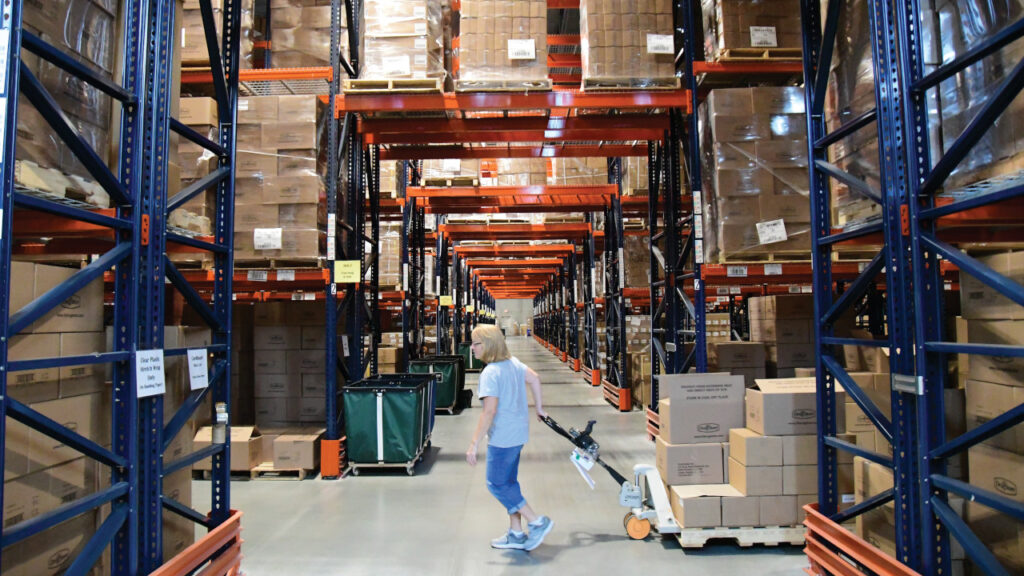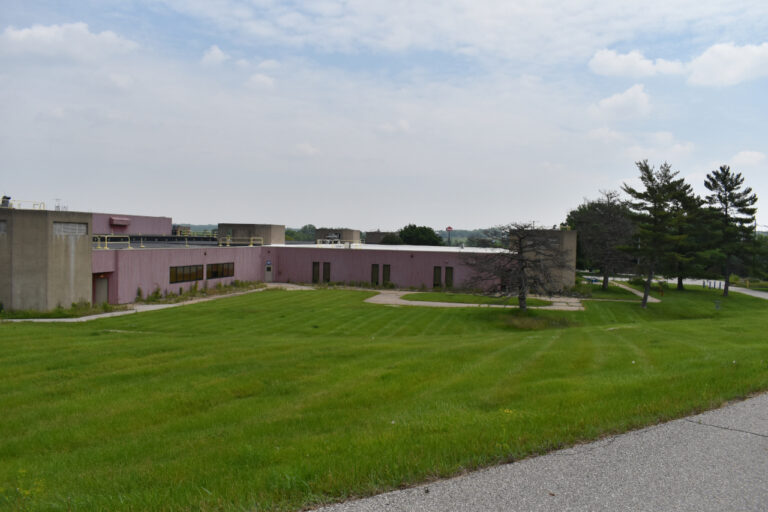Back in 1974, Lil’ Drug Store began with a simple value proposition:
“If you’re driving down the road and you have a headache, you need two pills, not 30.”
That’s the succinct description CEO Chris DeWolf offers of the company now co-owned by Mr. DeWolf and his wife, Suzy.
But that’s far from the whole story.
Fast-forward 50 years, and a basic premise has blossomed into an international enterprise with an estimated 180,000 retail locations and more than $500 million in annual retail sales.
So what’s the secret behind the success of this lil’ company that could? It’s essentially a blend of perseverance, adaptability – and a healthy dose of good fortune.
Company history
Lil’ Drug Store was founded in 1974 as the XL-800 Distributing Company in Pella, and was purchased in 1978 by Ms. DeWolf’s parents, Dennis and Donna Oldorf.

At the outset, Mr. Oldorf, originally from Stanwood and working as a banker in Chicago, reached out to the makers of four medications: Anacin, Tylenol, Bayer and Alka-Seltzer, recognized then and now as some of the best-selling products in their categories.
“Basically, my father in law said, ‘Hey, you know those little pouches of medicine you give away? How about I buy them from you?’” Mr. DeWolf said. “After a lot of hemming and hawing, they went back and forth, and (my father-in-law) said, ‘Listen, maybe you’ll lose less money than giving it away, maybe you’ll break even, or maybe you’ll even make a buck on this idea.’ They eventually said yes, and that’s where this business started.”
The Oldorfs moved back to Iowa and began assembling the famed yellow Lil’ Drug Store displays that are still used at many retail outlets. Mr. DeWolf recalls a time when hundreds of area residents would work from their homes, stapling or gluing medicine packets to the displays.
But the yellow displays weren’t entirely Mr. Oldorf’s idea, Mr. DeWolf said.
“He was financially trained,” Mr. DeWolf said. “He wasn’t a marketer. But someone told him that yellow captivated the eye. So if you look at our colors, they’re black and yellow. That’s not for the Hawkeyes, although I like the symmetry of that. It’s because someone told him, way back when, that yellow captivated the eye.”
At the time, convenience stores weren’t prevalent in the U.S., so Mr. Oldorf trekked around the Midwest, selling the yellow cardboard displays to gas stations and any other outlets he would find.
Resources weren’t plentiful during this time, Mr. DeWolf acknowledged.
“It started with two part-time employees and a commitment to pay them for three months,” he said. “That’s all they could guarantee, because they just had a couple thousand in the bank. And the rest is history.”
Lil’ Drug Store established its first freestanding facility on Oakland Road NE, near Coe College, then moved in the mid-1990s to a “very humble sheet metal warehouse” on Continental Drive NE, where the company remained before moving to their current location at 9300 Earhart Lane SW in 2018.
The new location, in a rapidly-growing industrial and commercial area, incorporated a 25,000-square-foot office and 80,000-square-foot warehouse, designed for energy efficiency and incorporating amenities such as a lunchroom facility, fitness area and employee walking trails on a roughly 13-acre campus.
“We built a footprint that was relatively similar to what we had before, with higher-density storage, and the business has continued to grow so much that we’ve had to keep adding space,” Mr. DeWolf said.
That growth was accelerated by Lil’ Drug Store’s 2020 acquisition of Convenience Valet, one of the company’s largest competitors at the time, which was operating a 120,000-square-foot warehouse in the Chicago area.
“We brought those jobs here and invested in robotics,” Mr. DeWolf said. “And that was really the catalyst to put on our latest addition.”
The addition, a 45,000-square-foot expansion of the company’s warehouse, opened in 2023. And it likely won’t be the last expansion of the company’s facilities, Mr. DeWolf said.
“We keep cutting deals,” he said. “This idea that was, for a long time, a very simple niche idea, has turned into a business, where if you walk into any convenience store, airport or hotel in this country, you’re going to see our products (if) you know what to look for. It drives my kids crazy all the time as I walk around, and I just sort of count them all out.”
Product diversification

While over-the-counter medication sales continue to comprise the majority of Lil’ Drug Store’s annual sales, the company has expanded its offerings several times over the years.
Lil’ Auto Store was introduced in 1992, making auto parts and accessories available in convenience stores. Lil’ Necessities was launched in 1998 to meet the personal care and general merchandise needs of travelers.
And in 2019, Lil’ Drug Store partnered with Associated Distributors to bring Wavelength brand cellular accessories and Images brand sunglasses to convenience stores.
“It’s a constantly evolving portfolio,” Mr. DeWolf said.
That evolution has come with some forks in the road. Lil’ Drug Store has entered into several new product areas over the years, and some have since gone by the wayside. Primary among them: The company’s foray into feminine care products, including well-known brands such as Replens.
“It was a great product,” Mr. DeWolf said. “In hindsight, we were lucky, and we built a substantial women’s health care franchise. From that base acquisition, these products were available in 35 countries around the world, in traditional retailers and online.”
The business was sold in 2014 to Church & Dwight, a consumer products company known for products such as Trojan condoms, Arm and Hammer baking soda and First Response pregnancy tests.
“These were really unique brands, but they weren’t core – they weren’t critical to our retail customers,” Mr. DeWolf said. “So we decided to take some chips off the table and redeploy into really growing in the area that we’re so successful in – the on-the-go consumer.”
The sale itself turned out to be profitable for Lil’ Drug Store.
“It was not only great financially, it was great for the maturation of our business,” Mr. DeWolf said. “We learned a lot. When you’re building and managing your own brands, you become a more sophisticated company. One misstep can cost you a lot of money, so you begin to invest in analytics a lot more, you talk in a more sophisticated way. It’s less transactional and more thinking about the holistic viewpoint of a brand. So I would say the benefit of that journey wasn’t only financial, it was that we grew up as a company.”
Today, Lil’ Drug Store offers about 1,200 products and is recognized among the foremost national players in over-the-counter health and beauty care sales in convenience stores, selling more than $400 million annually in that category alone – nearly three times their closest competitor. Outlets now range from convenience stores to hotels, dollar stores, airports, traditional drugstores, club stores, specialty outlets, grocery stores and mass merchandisers.
“If we’re doing our job right, a typical convenience store may carry a couple hundred of them,” he said. “If you walked around, say a Casey’s, Kwik Trip, or Kum & Go in this market, and knew what you’re looking for and counted them up, you’d see a couple hundred per convenience store location.”
For identification, product packages will often include a small yellow Lil’ Drug Store label, but generally the original product brand is still featured.
“These companies are spending hundreds of millions of dollars a year on advertising and brand building, and we want to highlight their brands,” Mr. DeWolf said. “Our brand is very well known on a business-to-business basis. The consumers don’t know our business. And that’s okay with us.”
Lil’ Drug also provides take-home sized private-label drugs to some of the largest convenience store chains in the country, as well as non-branded products that may be labeled as “pain reliever” or “cough suppressant.”
So with the diversity of products and services now available from Lil’ Drug Store, has a name change ever been considered? Mr. DeWolf said it wouldn’t be beneficial, based on the company’s legacy relationships with proprietors.
“We’ve done many market studies over the years about changing the name, but at the end of the day, we don’t see the value in going through a rebranding exercise when we have 50 years of brand equity built up with our customers – not with consumers, because the consumer doesn’t care. They want to buy Bayer aspirin, Tylenol, Nyquil, Dayquil. They don’t know that they’re buying them from our business, but the convenience store certainly knows.
“I always say we have a highly descriptive name that was right for 1974 that isn’t quite accurate today,” he added. “We’re no longer little, we sell more than drugs, and we don’t have stores. However, it’s a dominant brand in the industry in which we operate, so it still works for us.”
Packaging partnerships

While Lil’ Drug Store sells products across the U.S., the company doesn’t manufacture or package those products.
The company’s primary packaging provider is CCB Packaging in Hiawatha.
“They are a fabulous partner,” Mr. DeWolf said. “We’ve invested with them in multiple high-speed robotic lines. If you went up to CCB, you would see two very sophisticated high-speed robotic lines that are packaging on our behalf. In the ‘90s, we did that packaging ourselves, and honestly, we’re not very good at it. We’re good at sales, marketing, distribution, business building in the convenience channels. We’re not manufacturers. So we’ve basically outsourced that role and that responsibility to CCB, who has all the capabilities in the world, and honestly, is a hidden gem in the packaging world.”
Maintaining that relationship with a local company has been, and continues to be, important for Lil’ Drug Store’s business philosophy.
“We could do packaging all over the country, honestly, but there are very few companies that have the level of robotic capability and investment as CCB,” he said. “We’ve taken an approach to business that if we’re not good at it, we’re going to outsource it.”
As another example, Lil’ Drug Store has grown to about 200 employees, including 150 in Cedar Rapids and another 50 at remote locations nationwide.
“But we also have over 300 manufacturer reps that sell on our behalf into markets on a commission basis,” he said. “They’re not our employees. They represent other business lines as well. But we don’t need to directly employ all those people. We need to make sure we have the best solution for the responsibility.”
Once the packages are finished, they’re sent to Lil’ Drug Store’s massive distribution facility, where a beehive of workers and forklifts are constantly picking, packaging and shipping products to the company’s network of retail customers.
New services for clients

As the needs of Lil’ Drug Store’s clients have changed, the company has started to offer new services to help those clients succeed.
One of those services, Mr. DeWolf said, is a merchandising business.
“We have people that go out and set stores on our behalf, or for our customers,” he said. “That’s people going into a store to tidy up the store and put items where they deserve to be. If you go into any retailer, you’ll see people stocking the shelves. We have people that stock the shelves for you.”
The merchandising service is available in about 8,000 independent retail locations, Mr. DeWolf said.
Lil’ Drug Store has also seen significant growth in its analytics, insights and category management business.
“That’s helping our customers know what items to stock – whether they’re our items or not – how to price them, where to place them on their shelves, what type of promotions to offer,” Mr. DeWolf said. “We’re giving them advice on a regular basis about how to merchandise their consumers and to know what to sell.”
The service, which advises 50,000 retail locations, has expanded to larger companies. In July, Lil’ Drug Store inked a partnership with Procter & Gamble as the primary distributor of that company’s most popular personal health care products in the convenience channel. Other similar partnerships include Sanofi (a publicly traded pharma company) and Kenvue (the new name for Johnson & Johnson’s consumer health company). It also includes smaller independent businesses like Carmex lip balm, a family-owned business based in Wisconsin – Lil’ Drug Store has been managing their business in convenience stores since 2007 – and a partnership with Ricola cough drops in 2009 to serve as the brand’s exclusive supplier in the convenience channel.
“More and more suppliers are coming to us and saying, ‘We can’t do this effectively. Maybe we’re able to sell to drug stores or Amazon or mass merchants really effectively, but we do not know how to move the needle for our business in these fragmented channels. Will you do it on our behalf?’” Mr. DeWolf said. “What’s driving growth in this business right now is building continued scale, with people saying ‘You do it so well. Why would I build this myself? Take it over for me.’
“The value we offer to our supply partners is access,” he added. “We’re basically selling our access to complicated channels. The value we offer to our retail customers and our wholesale customers is a one-stop shop. You can do your entire health and wellness section from one company. We’ll take care of all the item selection. We’ll turnkey it for you. If you have an innovation, if you want to go into private label, we’ll do that for you. We’re able to offer you solutions and be a critical player for you in your supply chain.”
The new ventures are capitalizing on Lil’ Drug Store’s track record of merchandising success, Mr. DeWolf noted.
“They basically have said, ‘You are our pathway to market,’” he said. “And that’s been a really interesting growth phenomenon for us. Not only are we still selling that repackaged, on-the-go type format that started so many years ago, we’ve leveraged our market (leadership) and our relationships to go to other consumer health care companies and say, ‘If you really want to grow your business, let us be your pathway to market.’ That means we cut a deal with them where they give us their rights to represent their business, lock, stock and barrel, in these channels. As you start adding and developing these relationships, you’re able to demonstrate real results. People take notice, and they say, ‘Hey, you’re having success with these guys, would you take our business?’”
Growth trajectory

of a Home2Suites by Hilton Hotel in
Champaign, Illinois. CREDIT RICHARD
PRATT
Since 2000, Lil’ Drug Store has added 100,000 retail locations, partnered with 50,000 locations as a “category captain,” signed more than 30 strategic partnerships or acquisitions, grown its workforce by four times and multiplied community impact exponentially.
The company has earned several honors for industry leadership, including a Best New Product award, a Top Women in Convenience award and recognition as a Health and Beauty Care (HBC) Category Captain by Convenience Store News; a Top Workplace award from the Des Moines Register in 2023 and 2024; and recognition by The Wall Street Journal and Deloitte Private as a 2024 US Best Managed Company.
But as growth continues, how does LIl’ Drug Store deal with the notion of competition?
“We tend not to think about competition through the lens of who else does the original concept we had,” Mr. DeWolf said. “This business is predicated on intersecting a consumer at their point of need. It’s all about capturing the person when they have a headache and they’re on the go. These retail formats are small. So unlike a drug store that may have several thousand square feet under management, these are stores that have 2,000 square feet or less. So I tend to think about competition given the finite space that we’re operating within. We are susceptible to anyone that has a better selling, more profitable item than us.”
Very few other companies are doing traditional trial size packaging sales and distribution, Mr. DeWolf said.
“Anyone that has a better idea that can point to the convenience store owner or the airport location and say they’re going to make more money and solve an incremental consumer need by offering this item, we’re vulnerable to (that),” he said. “So we always have to have the best-selling items and make sure the profit profile is right for our clients.”
Convenience stores have been investing heavily in food service, taking space away from other types of merchandise, Mr. DeWolf noted, so “we have to constantly be vigilant to make sure we’re providing real value, so we’re not under attack from some other corner of the store.”
Community impact, proudest moments

Lil’ Drug Store has historically emphasized its role as a community partner, supporting several nonprofit ventures and organizations.
The Dennis and Donna Oldorf Hospice House of Mercy was named after the founders of the business, after Mr. Oldorf died of cancer and Ms. Oldorf “really wanted to recognize him.”
Other significant beneficiaries include the DeWolf Innovation Center for Aging and Dementia and Hancher Auditorium and the Stanley Museum of Art at the University of Iowa.
“We believe arts are a great way to reach many people across many different places in life,” Mr. DeWolf said. “They’re a very important element of society.”
In total, Lil’ Drug Store has contributed more than $18 million to nonprofits in the past 20 years, and for its 50th anniversary, the company is pursuing an effort to log 500 volunteer hours by its employees.
“As we are successful as a company, we have a responsibility to put resources back into the community,” Mr. DeWolf said. “We believe that most people in today’s workforce want to work for an organization that has a value orientation. They want to give back. Put another way, people generally don’t roll out of bed in the morning, excited just to sell more boxes of pills, but if they can relate the success of the company to doing something amazing, like investing in a hospice house or supporting a local organization, that gets people excited. No matter what your role is in this company, we want you to understand that the more successful you are and we are as a company, the more impact we can have on our community.”
Mr. DeWolf also takes pride in the growth of the company, particularly in the past quarter century.
“When we got involved in 2000, the business was quite a bit smaller, and it wasn’t doing exceptionally well,” he said. “It was struggling, to be honest. It was at a reasonable size, it had gotten through all the challenges of early growth, and it had survived, but it was petering out a little bit. We weren’t taking investment risks. The team we had was strong, but not as strong as it is now.
“My proudest moment is to look back over this journey since 2000 and see not only have we grown on a scale basis, but as we’ve professionalized the organization, and as we’ve attracted amazing talent to this organization, as we built our brand internationally and domestically,” he added. “We always felt it was a possibility, but to see that come to life, we’ve been very fortunate. We have very low turnover. We’ve had key members of this team in place for the past 20-plus years, and they’ve been on this entrepreneurial journey with us.”
Legacy, succession
Mr. DeWolf said he’s fielded “countless” offers to purchase Lil’ Drug Store, but said he and his wife Suzy plan to keep the business in family hands for a third generation.
“I think people sell their businesses when they don’t have a succession plan, or when they run out of growth opportunities,” he said. “That’s not our issue. We focus on succession every day here, and we have so many growth opportunities, so that’s not a challenge. We are a second-generation family-owned business. When we bought it from her family, our commitment to them was that we were going to do everything we could to make a successful third-generation family-owned business.
“If you meet our team and chat with them, they’ll tell you the secret of this place culturally is that we have a nice balance of family feel, which drives engagement, connectedness and a personal touch, with the disciplines of a major corporation,” he said. “So often you see family-owned businesses lacking those disciplines, and what happens is the companies peter out with their growth and their sophistication. If we’re going to be a third-generation family owned business, we have to stay connected to the personal connectivity that’s made us so successful to date, but we also have to have the same disciplines as a major company – investing, taking risks, hiring the right people, putting infrastructure in place, thinking about the next 10 or 20 years, not just today.”
So does that mean one or more of the DeWolfs’ three children will handle the day-to-day operations in the future? Not necessarily, Mr. DeWolf said.
“They’re still in their early 20s, so we’ll find out,” he said. “This business has become of a scale that it’s not necessary for one of our children to be running it. It won’t necessarily be a family-run business, but a family-owned business. What we are focused on with our kids is to teach them the principles of governing the business, because at a minimum, they’re going to need to know how to manage a professional organization. They need to know how to hire a CEO, how to run a board of directors. These are the skills that we’re focused on, whether or not they choose to make this a place that they want to build a career.”
Mr. DeWolf said he remains grateful that Lil’ Drug Store has continued to experience growth and success.
“It’s such an amazing story of how a simple idea can blossom with the right team, a little luck and the right outlook,” he said. “Just look around Cedar Rapids and Eastern Iowa. There are a lot of companies like our company, or maybe our company 20 years ago – they may be smaller, but that doesn’t mean they’re not valuable. You just have to unlock the right recipe for success. We’ve been lucky. I look at the odds of hitting one year as a company. Getting to 50 is quite difficult. And doing it at the scale we are is even more difficult.
“I think we can get romanticized into thinking about who’s creating the next Google or whatever,” he added. “Just look around. There’s all these amazing companies that are a little under the radar that do things that you walk by or use every day. Ours has been the story of how a simple idea can turn into something absolutely significant.”









